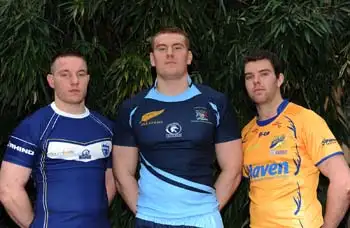Rimmer excited about Championships gamble

RFL chief operating officer Ralph Rimmer has faith that the three new additions to the ranks of semi-professional clubs in the UK can thrive.
University of Gloucestershire All Golds, Hemel Stags and Oxford are the three new clubs who will be competing in Championship One this season.
Rimmer admits that the move could be chancy, but remains confident in its success.
“I think it’s fair to say that’s true. We are taking a gamble of sorts,” Rimmer told Love rugby League
“We know it’s a calculated risk. But nevertheless, we’ve never seen more interest in Championship One than this year in the build-up to the competition
“But probably half are watching it to see a plane crash, and half are looking at it because they think it’s a genuinely exciting idea.
“So, let’s see how we go.”
The Chief Operating Officer was also keen to stress that the whole process of assessing where clubs should be was all about what they could offer to the competition.
There was no plan to put clubs in rugby union-orientated areas, for example, as a way of finding potential new fans.
“Basically this restructure came about through a consultation process which involved everybody in the game,” Rimmer explained.
“All factions – players, administrators, press, sponsors – everybody contributed to what the game should look like.
“However, once we got over that position, then we went out to tender, and we looked for expressions of interest.
“We got 35, which shows what a lot of work went into it. Then we drilled down into all of those just to find what we thought were the best, which was originally four but is now three clubs in this instance.
“They were the three clubs we felt could offer the most to the competition, which we thought were the best prepared.
“So once we got through the expressions of interest, it was just about the best propositions. We haven’t sought particular areas.
“We’ve looked at the business models, the playing models, and how they can sustain themselves going forward. We’ve chosen the clubs on that basis.”
While Scotland and Ireland have international sides, they currently do not have any professional clubs in place.
Rimmer confirmed that there were some applications from the Celtic countries, but more development work is required.
“We did have some applications from Scotland and Ireland, as well as more in Wales,” he said.
“They failed because they just weren’t strong enough.
“But every club we’ve been out to visit we’ve said to them that we want to extend the concept of what we’re doing, and given some pointers on how they might improve what they’re doing.
“So again, Super League in particular in the past has fallen by the policy of choosing an area and trying to put a club in it.
“We’re not doing that this time. we’re advertising for clubs and seeing if what they can offer is good enough to bring them into the competition.
“So it is purely down to who comes to us.
“All three of the clubs that have come in have really different models.
“It’s absolutely a unique model in each one. But each one has been tested and we think we’re going to come out with three clubs who are really going to offer something different to the competition.
“I’m really pleased to see the standard of the three coaches they’ve appointed too, as they all really know what they’re doing.”
Despite the expansion of the geographical reach of the game, there is still a big gap in the Midlands in terms of professional clubs.
There could soon be some steps to remedy that situation, though Rimmer stressed that geographical considerations were at a minimum in the way the process of expansion is now being carried out.
“We’ve quite publicly said that we are working with Coventry at this time to see whether they can be the tenth team in for 2014,” he said.
“It is a gulf in the Midlands. There was nothing planned about that. It was simply a case of the strength of the offers.
“But Coventry are probably the next off the taxi rank.”
One thing which has played a massive part in the establishment of the new semi-professional clubs is the influence of student rugby league.
Rimmer believes that the strength of the student game is a massive bonus to the sport in Britain, with the standard developing all the time.
“The student game is hugely important, I think,” he insisted.
“Student rugby league is greatly underestimated. It’s a great standard. If our students can go over there and beat the Australians, it demonstrates the quality of player there is.
“Then you’ve got players like Alex Walmsley, of course, who are coming through into Super League.
“The Championships are full of student rugby league players. One of the things we don’t do is cultivate them as much as we should.
“So when we’ve gone out and foudn these areas and marketed the proposition to people in the area, then guess what?
“Former students suddenly put their hands up and say, ‘I quite fancy a go at that.’
“Clearly Gloucester have built heavily on students, and Tony Benson (All Golds coach) has said how pleased he is at the standard of player they have in their squad.”